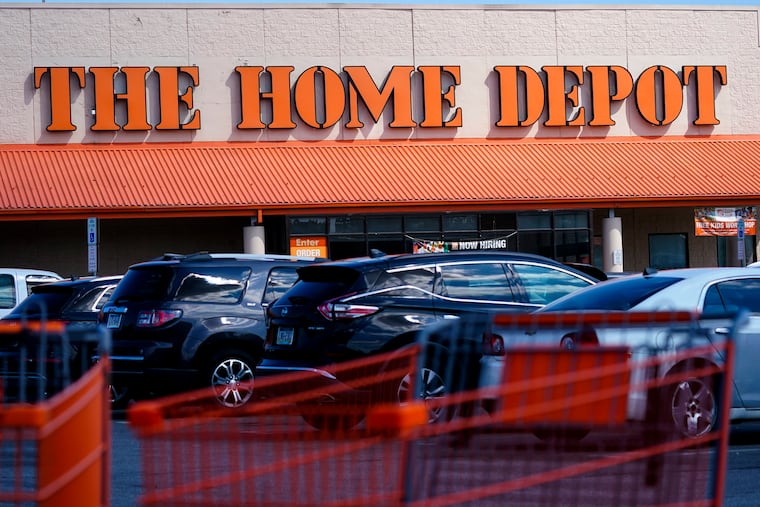Home Depot workers in Northeast Philly allege ‘surveillance,’ other union-busting tactics ahead of election
Workers will decide next month whether to form the first storewide bargaining unit for the home improvement giant.

Workers at a Home Depot store in Northeast Philadelphia allege that managers have been engaging in union-busting tactics ahead of the store’s scheduled union vote next month, when hundreds of workers will decide whether to form the first storewide bargaining unit for the home improvement giant.
In a complaint filed last week with the National Labor Relations Board, Vincent Quiles, the lead organizer for Home Depot Workers United, claimed that managers had been “interrogating” and “surveilling” employees about their union activities since workers announced plans to unionize.
“They’re trying very hard to play mind games with fear-mongering and propaganda,” Quiles, 27, said in an interview.
The allegations are the latest development in the unionization effort that was launched in September when more than 100 workers submitted signatures to the NLRB seeking representation for the store’s 274 merchandising, specialty, and operations associates.
The federal labor board has scheduled the union election to begin on Nov. 2, when Quiles said eligible workers will begin casting ballots at the 4640 Roosevelt Blvd. branch.
Management at the Northeast Philadelphia branch could not be reached by phone Wednesday. Sara Gorman, a spokesperson for Home Depot, denied the allegations and said the retailer would cooperate with the NLRB’s investigation.
“We’re confident we haven’t committed the alleged violations,” Gorman said. “Our focus is on engaging with our associates and continuing to make Home Depot a great place to work.”
If workers vote in favor, the new union would add to the surge of labor organizing that has been rankling behemoths from Amazon to Starbucks. But the fledgling group — which is organizing independently, without affiliation with an established union — faces a tough battle, union organizers said.
» READ MORE: Home Depot workers in Northeast Philly petition to unionize, in what could be a national first
“Big corporations have really elaborate and sophisticated union-busting tactics,” said Paul Prescod, a Philadelphia labor organizer who ran unsuccessfully for Pennsylvania’s state Senate this year. “Basically, any way they can sow fear and divide workers … it’s going to become more intense.”
Over the last month, Quiles said, he hasn’t worked a shift without store managers trying to monitor his conversations with other employees. It happens to other employees, as well, he said.
“Any time they have a group of us, literally any conversation that I have with people, there will be a manager there jumping in,” Quiles said. “And it’s just conversations, like, ‘How’s your family doing? How was that trip you took last weekend?’ Things you talk to coworkers about.”
Quiles also described a series of what labor organizers call “captive audience meetings,” in which managers meet with small groups of workers during their shifts to dissuade them from voting for the union. According to Quiles, supervisors have tried to warn workers about the cost of union dues, while making promises about improving working conditions without collective bargaining.
Such captive audience meetings are legal, but a recent push from the Biden administration’s adamantly pro-union labor board is seeking to reverse that precedent.
Jennifer Abruzzo, general counsel for the NLRB, issued a memo in April seeking to overturn the existing case law that allows for such mandatory meetings, which she calls “at odds with fundamental labor-law principles.”
It’s unlikely the NLRB will issue a ruling about the Home Depot surveillance complaint before the scheduled November vote. Federal labor regulations allow for workers to file objections within seven days of the ballot tally over any alleged conduct that might have impacted the outcome.
Should workers vote to unionize, the battle is only half won.
New unions sometimes spend years trying to secure their first contract. It took two years and a contentious 19-day strike for workers at the Philadelphia Museum of Art to secure theirs. Prescod noted that major corporations have shown willingness to spend their massive resources to stall contracts, and even seek to decertify the union.
For now, Quiles said, he is trying to show a unified force with his colleagues, though many are afraid of speaking out.
“The attitude in the store is that a change is needed,” he said, “but there’s still more work that needs to be done on the union side to pull people in.”